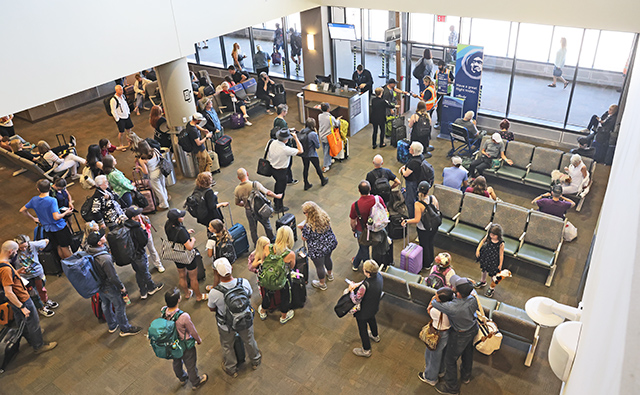Farm-machine maker sticks around
Published 5:00 am Tuesday, June 12, 2012
REDMOND — At age 87, Marinus “Junior” Newhouse stands out as the senior employee of the company he founded in 1953, Newhouse Manufacturing Inc.
The company’s owner and president, Newhouse recalls its earliest days, in Terrebonne, with clarity and pride. He followed his father there from Oregon City. His father wanted to farm, but Junior Newhouse did not.
Newhouse found he had a knack for building cattle chutes, an elevator for hay bales and other devices that could solve problems for farmers in the area. He sat on the floor and drew designs on paper and then made the machines by hand, he said. Later, his father trucked the machines from Terrebonne to farms throughout the region.
But Newhouse Manufacturing isn’t stuck in the past.
Over several years, the company, which moved to Redmond in 1956, has expanded its market to the entire Northwest. It also sells some equipment to commercial farming operations in other countries.
General Manager Dan Winton, who designs most new products nowadays, is looking to do more business in the Midwest.
New products come out all the time. Walking about the yard surrounding the company’s main building north of downtown Redmond, Winton pointed to prototypes of new vegetable shredders and hay balers. One shredder carried an $83,000 list price, Winton said, but most other products cost between $15,000 and $50,000.
In step with other manufacturers, Newhouse Manufacturing has modernized its design and production methods, while employing plenty of workers to weld, paint, tinker and do other hands-on tasks.
Some things haven’t changed much. Newhouse hasn’t stopped showing up for work in almost 60 years.
Q: How many products does Newhouse sell? How many were sold in the past?
A: Newhouse: Oh, there’s a lot of them. Some of them (have been) discontinued.
Winton: Over the years, it’s just (been) an ebb and flow of what people want, and what’s hot at the time, and as it dies out, you just have to move into new product lines. You’d be surprised. At least a couple of times a year, somebody comes in and says, “Can you guys still build those sideloaders?” It’s like, “No, we haven’t built them since the ’70s.” It’s nice to know they’re still out there. But it’s been harder, I think, in recent years, trying to find that one product that will last a long time, because the market’s so (frequently) changing. The shredders seem to be the most stable thing out there right now, but potato markets are very volatile. It all depends on the contracts and the cost of the asset.
Newhouse: Yeah, potatoes have been going in and out of it, just like poultry did. Oh, man, one year it would be good on the price of eggs and everybody would want laying hens, and maybe the next year eggs went down in price, so then they’d go into raising fryers and broilers.
Q: What’s the longest-running product Newhouse Manufacturing makes?
A: Winton: Mint tubs. Well, unless you consider the bale elevator. We still build (those, which) he started way back in Terrebonne. We don’t sell a lot anymore … But the longest-running viable one that actually creates good revenue is the mint tubs (for cooking mint).
Q: Why is your industry more resistant to recessions than others?
A: Winton: It cycles different than the regular (economy). And I think it’s mainly because ultimately we’re supplying food, and everybody has to eat. Even in bad times, you have to eat. And so the market just is determined by other factors. Is there a drought in the South? Are we short on wheat? Is that going to raise the price of it?
Q: What’s the future of the company?
A: Winton: We’re going to stick with our motto of continuing to build short, small runs of highly specialized equipment that is above industry standards. In other words, we’re never wanting to do something that we’re doing thousands of at a time. We always want to stay in our niche markets, like our potatoes, our mint, our onions, our garlic, and we want to build the best equipment for those specific (agricultural products). … The short-term future of Newhouse is to expand our universal shredder line and our windrowing shredder line into the Midwest. … That is where we (think) at least the next 10 to 15 years of the company’s backbone is going to be. … Being able to offer upgrades to existing equipment is going to be really key. … Other than that, really trying to possibly expand the markets with … distributors, because they do all the footwork for you. … Farmers buy from people. More than anything, a farmer buys from somebody that he trusts. And we can go out there to the Midwest and say, “Buy our equipment. It’s the best.” He doesn’t know you.
Q: Many aspects of the company have changed. What will stay the same?
A: Winton: Junior has really instilled upon us the quality of — he builds stuff to last. He doesn’t build cheap stuff — just never has.
Newhouse: I did one time.
Winton: And how did that turn out for you?
Newhouse: Oh, no good. Had to do more repair work on it than everything else.
Winton: That was on a sideloader, right?
Newhouse: Yeah. And it was an economy one. It was economy, all right. Oh, man.
Winton: I would say what will never change at Newhouse is we will always build high-quality — higher-priced, but high-quality — long-life machines. We won’t sacrifice the longevity of a machine for price. You either buy it or you don’t. If you want the best, you buy it. If you don’t, go buy “insert X name here.”
The basics
What: Newhouse Manufacturing Inc.
Where: 1048 N. Sixth St., Redmond
Employees: 27
Phone: 541-548-1055
Website: http://newhouse-mfg.com






